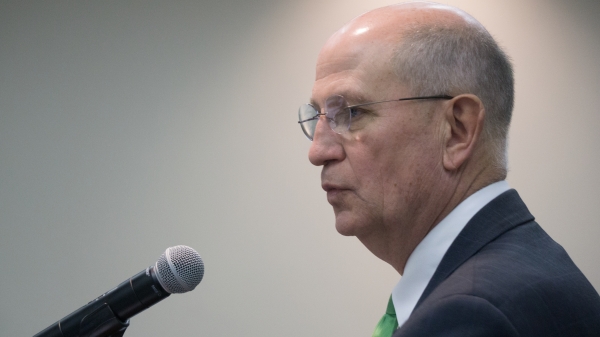By Brandon Moseley
Alabama Political Reporter
Thursday, March 17, the Alabama House of Representatives passed House Bill 333, sponsored by State Representative Mike Jones (R-Andalusia).
Under current Alabama law when a couple divorces and neither parent is unfit generally the courts award custody of the children to one parent and the other parent gets visitation rights (every other weekend, a week in the summer, and a couple of holidays is ~the norm). Father’s rights groups like the Alabama Family Rights Association (ALFRA) have been advocating for joint custodial arrangements to become the norm.
HB333 changes existing law, but critics say that it makes this too complicated. HB333’s synopsis says, “Existing law specifies that it is the policy of this state that parents who are divorced or separated have frequent and continuing contact with their children. Existing law also specifies that joint custody does not necessarily mean equal physical custody. This bill would revise existing definitions regarding custody to be consistent with terminology used in case law and to move away from the concept that one parent has sole physical custody, while the other parent has visitation rights. Existing law requires the parties in a child custody matter to submit a parenting plan only in cases where the parties request joint custody. This bill would require the parties to submit a parenting plan in all cases. This bill would also authorize the court to establish a parenting plan when the parties are unable to agree upon one. This bill would specify additional remedies to a party when a parent, without proper cause, fails to adhere to the time sharing schedule in a parenting plan including makeup parenting time and reimbursement for costs and attorney fees.”
State Representative Tim Wadsworth (R-Arley) opposed the bill. Wadsworth, who is a practicing attorney, told the Alabama Political Reporter that, “HB333 is a really bad bill that passed the House with just 8 of us voting against. The parenting plan will raise the cost of all divorces plus will result in more contested divorces.” “Further it essentially opens the door for more litigation and attorney fees,”
Rep. Wadsworth said, “I hope it dies in the Senate.”
Rep. Wadsworth said in a statement on Facebook, “HB333 Bill changes child custody provisions, requires all divorces with children to have a parenting plan established by legislators and provides remedies for violations. There are plans for birth to age 3, ages 4-5, 6-12, and teenage years 13-19 under numerous issues. 176 page draft of plans. Requires plans to be approved by court. Children need both parents. This bill is ridiculous. Legislators should not be micro-managing people’s lives and their children’s lives. 176 pages.”
ALFRA President Kenneth Paschal urged legislators to vote NO on House Bill 333. Paschal said that it was a bad bill and that sponsor State Representative Mike Jones has been misleading the legislature.
President Paschal wrote, “Although HB333 suggests that children should have “frequent and continuing” contact with their parents; the bill fails to define frequent and continued, and preserves the status quo of standard visitation, which unduly restricts a child to 4-6 days a month with one parent.”
On Sunday, March 13 Paschal told the Alabama Political Reporter, “My goal is the bill will be amended on the House floor.”
According to Paschal, “Experts in family systems, psychology, sociology, and the like have presented 40 studies, and 112 social scientists around the world have reached a consensus on shared parenting which states ‘…equal or approximately equal time-sharing with a minor child by both fit parents is in the best interest of the child.’”
President Paschal said, “The proposed bill ignores this research. As a result, HB333 fails to equally protect the parent-children relationship with both fit parents, and places Alabama children at risk for juvenile imprisonment, teen pregnancy, suicide, drug use, and sex trafficking.” ALFRA is not satisfied that HB333 goes far enough toward their goals.
HB333 has passed the House and is now before the Alabama State Senate.
















































